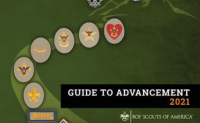 A young man, well-liked in his school, just months away from graduation, elected as homecoming king by his classmates, takes his own life.
A young man, well-liked in his school, just months away from graduation, elected as homecoming king by his classmates, takes his own life.
Another young man, also popular in high school, another homecoming king – valedictorian, accepted at a prestigious university – ends his own life as well.
Another young man fails to awaken one morning. His parents find him groggy and unresponsive. After three days on a ventilator in intensive care, he starts to come out of it. He eventually recovers, but his family is scarred by the incident.
These may be isolated incidents, but they happened in my community – and within the last few months. It’s not just happening here – it’s in towns and cities across the nation. One community not far from here – home of one of our Scout camps, in fact – has had a string of teenage suicides over the last couple years, including my nephew. Scouting is sometimes touched by tragedy, too. Earlier this fall, a Scout in Washington state took his own life. A young man who had been in Scouting in Ohio did the same.
Suicide is the third leading killer of teenagers in the United States, behind accidents and homicide. The rate of teenage suicides has tripled in the last 35 years, and one in six teens reports having attempted suicide. The physical, mental and emotional changes that are happening in an adolescent’s mind and body can, as we know, cause irrational behavior to overrule the normal course of thinking. Teens don’t understand that what may seem like the end of the world to them are almost always transitory issues that will resolve themselves with time.
The things we read about children who commit suicide – “a normal child”, “always helping others”, “kind parents and good family life”, “cherished and taught to do right” – these words almost always describe our Scouts. It goes to show that you never really know what’s going on in someone’s life, but we can help stem the tide by being that trusted presence outside the family.
As the nation’s leading youth program with millions of teens in our care, what can Boy Scouting do to help teenagers understand and prevent suicide?
As trusted adults, sometimes the only adults that a Scout is comfortable talking with outside his family, we as Scout leaders are in a unique position to be on the front line of teenage suicide prevention. By checking in with our Scouts, by keeping an eye on their behavior and moods, by talking with them about their lives in Scoutmaster conferences and boards of review, and watching for changes in the way they act and what they say and do, we can see the early warning signs of trouble and help them to understand that life is worth living and that their problems are only temporary.
Venturing Youth Protection Training covers the issue in one of the segments on personal safety awareness, but it’s not discussed in either the Boy Scout personal safety presentation, A Time to Tell, or in the youth protection training that adult leaders take. From the Venturing training:
Anytime a teen talks about life not being worth living, the adults in that teen’s life need to respond. An initial response might be talking to the teenager and identifying your concern. For example, you could say. “I am really concerned when I hear you say that you don’t believe that life is worth living. Can you tell me  what’s happening in your life that causes you such pain?†To follow-up, you can ask if the teen has talked  to a counselor, spiritual advisor, parent or other trusted adult about the problems. Let the teen know that you are there for him or her and offer to help them seek help.
Here are some other things we can do:
- An article in Scouting Magazine from 2002 gives us advice on recognizing and acting on impulses that can lead teens to suicide. Read and follow the advice in the article.
- Present a program for the community. Some troops in places like Tennessee are conducting suicide prevention programs for their Scouts and the community, bringing in experts on the subject and helping parents and Scout leaders recognize the risks and warning signs.
- Community groups and high school student organizations all over the country are holding seminars and programs like this one in one of my neighboring communities. If you’re not ready to organize a meeting like this yourself, consider taking your troop next time there’s a program near you.
- Or invite your police or clergy to come to a troop meeting and talk about the subject. The more information we give our boys, the better.
- Know the national suicide prevention hotline phone number:Â 1-800-SUICIDE (800-784-2533).
And when a Scout comes to you and asks to talk about something, don’t brush him off – don’t say “I can meet with you a week from Tuesday” – because that could be too late.
Image courtesy of zirconicusso / FreeDigitalPhotos.net
This post first appeared on Bobwhite Blather.




